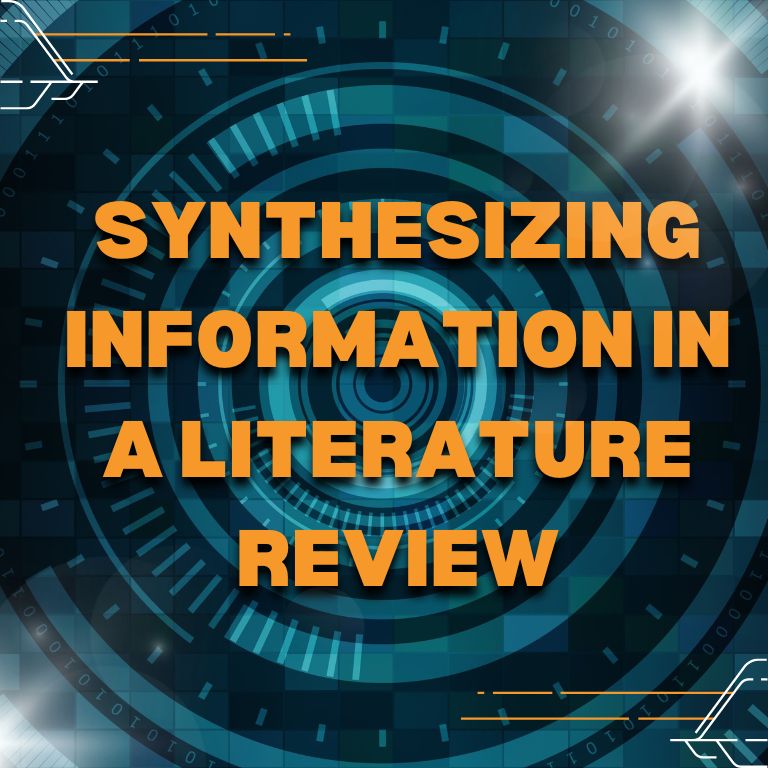Introduction: Synthesizing Literature
Synthesizing literature is a crucial aspect of conducting a comprehensive literature review in any research field. It involves combining information from multiple sources to create a coherent understanding of a particular topic. This article will explore techniques for synthesizing literature, emphasizing the importance of this process in academic research. We will also highlight how MyWordAi.com, an automated academic writer powered by ChatGPT, can assist researchers in synthesizing literature effectively without the need to master AI prompting.

Understanding Academic Synthesis
What is Academic Synthesis?
Academic synthesis refers to the process of integrating information from various studies to form a unified perspective on a research topic. Rather than simply summarizing individual studies, synthesis involves analyzing and connecting different findings to uncover patterns, contradictions, and gaps in the existing literature. This approach allows researchers to develop a deeper understanding of the subject matter and build a solid foundation for their own research.
Why is Synthesis Important?
Synthesis is essential for several reasons:
- Enhancing Understanding of Research: By synthesizing literature, researchers can see the broader context of their topic, identify trends, and understand how different studies relate to one another. This holistic view aids in framing research questions and hypotheses.
- Avoiding Plagiarism: Effective synthesis ensures that researchers do not merely copy and paste information from various sources. Instead, they critically engage with the material, paraphrasing and integrating insights into their own narratives.
Techniques for Synthesizing Literature
Combining Sources Effectively
To synthesize literature successfully, researchers should focus on identifying key themes across different studies. This can be achieved through comparative analysis, where similar findings are grouped together, allowing for a clearer picture of the research landscape.
Organizing Information
Organizing information is vital for effective synthesis. Creating synthesis matrices can help researchers visualize connections between studies, highlighting common themes and divergent findings. Additionally, using visual aids like concept maps can enhance understanding by illustrating relationships among key concepts.
Step-by-Step Guide to Synthesizing Literature
Step 1: Identify Key Studies
Start by conducting a comprehensive literature search to identify relevant studies. Use databases like Google Scholar, JSTOR, or your institution’s library resources to gather articles, books, and reports related to your topic.
Step 2: Extract Relevant Information
Once you have identified key studies, extract relevant information, such as research objectives, methodologies, findings, and conclusions. Organize this information systematically to facilitate the synthesis process.
Step 3: Analyze and Compare Findings
Analyze the extracted information, comparing and contrasting findings from different studies. Look for patterns, similarities, and discrepancies, which will help you understand the overall landscape of research on your topic.
Step 4: Write the Synthesis
Finally, write the synthesis by integrating your findings into a coherent narrative. Ensure that your writing reflects a critical engagement with the literature, synthesizing the information rather than merely summarizing it.
Utilizing MyWordAi.com for Literature Review
What is MyWordAi.com?
MyWordAi.com is an automated academic writing tool designed to assist researchers in creating high-quality literature reviews and other academic content. Powered by ChatGPT, this platform simplifies the writing process, allowing users to focus on the content rather than the mechanics of writing.
How to Use MyWordAi.com for Your Literature Review
- Visit MyWordAi.com or download the app from the PlayStore.
- Log in or sign up.
- Go to Complete Research Writer and open the Literature Review section.
- Fill in the following fields:
- Research Topic: Enter your specific topic.
- Generate: MyWordAi will produce a structured literature review based on your topic.
- Edit and Finalize: Review the generated content, making any necessary adjustments to align it with your academic style and requirements.
Synthesizing Literature: Sample of the Research Section/Topic
Title: The Impact of Climate Change on Global Agriculture: A Synthesis of Literature
Introduction: Climate change poses significant challenges to global agriculture, affecting crop yields, food security, and farmer livelihoods. This literature review synthesizes research findings on the impact of climate change on various agricultural practices and regions.
Key Studies: Several studies highlight the adverse effects of rising temperatures and changing precipitation patterns on crop yields. For example, Smith et al. (2020) conducted a meta-analysis revealing a 10% decline in wheat yields in regions experiencing severe drought conditions. Similarly, Jones and Brown (2019) found that climate variability significantly affects crop diversity in sub-Saharan Africa.
Synthesis: The synthesis of these studies reveals a consistent trend: climate change negatively impacts agricultural productivity across different regions. However, some studies suggest adaptive measures, such as improved irrigation techniques and crop diversification, can mitigate these effects. This synthesis underscores the importance of integrating climate resilience into agricultural policy.
Synthesizing Literature: Step-by-Step Guide on How MyWordAi.com Can Be Used to Write This
- Download the App: Visit the Google Play Store and download MyWordAi.com.
- Create an Account: Sign up for an account to access all features.
- Enter Your Topic: Input your research topic into the designated field to generate a tailored outline.
- Select Literature: Use the app to search for and select relevant literature based on your topic.
- Generate Synthesis: Allow MyWordAi.com to analyze and synthesize the selected literature into a cohesive document.
- Review and Edit: Carefully review the generated content for accuracy, relevance, and alignment with your academic standards.
- Final Touches: Make any necessary adjustments before finalizing your literature review.
Conclusion
In conclusion, synthesizing literature is a vital skill for researchers, enhancing their understanding of a topic while preventing plagiarism. Utilizing MyWordAi.com can streamline this process, allowing researchers to focus on critical engagement with the literature. By adopting the techniques outlined in this article, you can create effective literature reviews that contribute significantly to your research.
If you’re looking to make your academic writing easier and more efficient, consider using MyWordAi.com. Download the app today from the Google Play Store and experience the benefits of automated academic writing powered by ChatGPT.